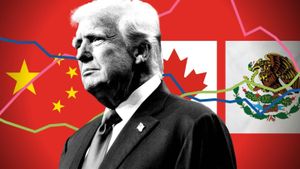Labour has accused the Conservatives of showing "some real brass neck" after comments made by shadow home secretary Chris Philp, who stated on the BBC's Political Thinking podcast, "I do a bit [think Britain is missing 'a belief in hard work']." Philp’s remarks come as figures released this month indicate there are 9.3 million economically inactive people between September and November last year, slightly down from the previous year but still indicative of serious underlying issues.
Philp pointed out the need for the UK to develop a stronger work ethic to compete with nations like South Korea, China, and India, stressing, "We need a work ethic to compete as hard as we can." The number of economically inactive individuals, as noted, is exacerbated by various factors: around 25% are students, and about 30% have long-term illnesses. The economic inactivity challenge has grown significantly since the pandemic.
The Labour Party quickly pushed back against Philp's comments. A spokesperson remarked, "After the Conservatives’ economic failure left working people worse off, it takes some real brass neck for the Tory top team to tell the public it’s really all their fault." This sentiment captures the growing frustration among Labour leaders as they point fingers at the Conservatives for the nation's economic struggles.
Daisy Cooper, the Liberal Democrat deputy leader, added her voice of dissent by criticizing Philp’s past performance. She recalled his role as chief secretary to the Treasury under Liz Truss, which was marked by tremendous economic turmoil over just 39 days. “The British public will no doubt take his advice with a bucketload of salt,” she stated, highlighting the perceived hypocrisy behind Philp’s call for responsibility among the populace.
When asked to respond to the criticisms against him and his government, Conservative leader Kemi Badenoch stated, "I think everybody should be working hard, including myself." This attempt to assert the need for hard work aligned with Philp's initial message; nonetheless, it did little to quell the backlash from Labour and Liberal Democrat representatives. Critics are eager to remind the public of the government's role at the center of recent economic challenges.
Overall, the discourse surrounding this issue reveals the continued fallout from the economic policies employed over the past few years. Following the turbulent governance under Conservative leadership, the prevailing narrative seems to depict the government as somewhat disconnected from the realities faced by ordinary citizens. Philp's remarks strike at the heart of these growing tensions as both parties jockey for public perception amid the backdrop of economic struggle.
Analysts have noted the complex reasons behind the significant number of economically inactive people, indicating it’s not merely about work ethic but also includes systemic issues like healthcare accessibility, educational opportunities, and other social determinants influencing labor market participation. Critics argue blaming the work ethic misses the larger picture of how policy decisions affect everyday lives.
Notably, Philp’s comments emerged against the backdrop of the latest economic inactivity statistics, muddying the waters of responsibility between the ruling party and the general public. While Philp seeks to rally the nation around the need for collective effort, his remarks may instead draw attention to the Conservative policies perceived to exacerbate economic challenges.
Whether the Tory party can effectively connect with voters on work ethic, as suggested by Philp, remains to be seen. If anything, this episode highlights the growing urgency for both parties to address the myths and realities of economic productivity, communal effort, and the role of governance therein.
Indeed, as stark as the debate over the work ethic has become, the more pressing issue at hand remains how to bridge the chasm between government aspirations and the day-to-day experiences of those it seeks to govern. For now, the tension between the Conservative narrative and the Labour critique defines the political conversation around work and economic contribution within the UK.



